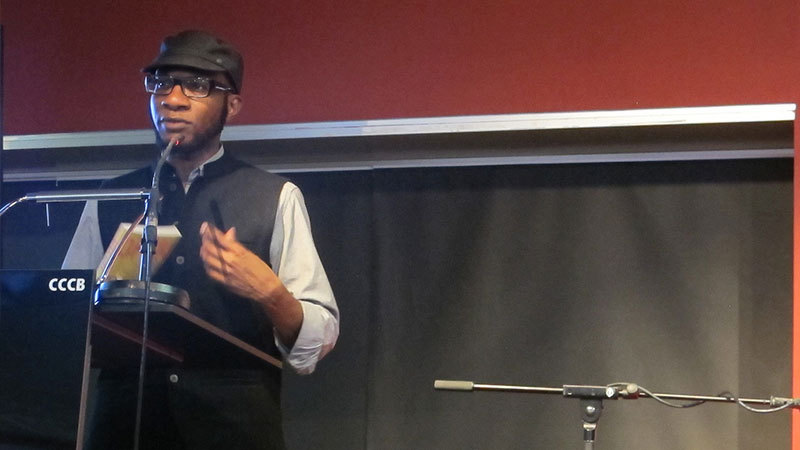“I’m a machine for transforming pain into language and coffee into urine,” said Teju Cole, referring to the process of writing his most recent novel, Known and Strange Things. The audience laughed with the award-winning essayist and first guest of SJC’s Fall 2016 Brooklyn Voices series. In conversation with journalist Amitava Kumar, Cole charmed the packed Tuohy Hall Auditorium with an evening of banter, using humor to punctuate more weighty themes.
Known and Strange Things is a collection of essays on Cole’s interpretation of both abstractions and the tangible, so discussion began with the natural, but deceivingly simple, question: What happens when he initially encounters these various forms of art? He waits for the piece to show him something that not everyone may see, Cole explains. Only for the works that pierce him and demand a response will he warrant one; “I want to see the artist behind the art.”
Noting the intricacy of Cole’s essays, Kumar observed the constellation of thoughts, each relating in some capacity to the next. Cole tells us that the key to this complexity comes from differentiating between a take and an essay. “I can have a take on many things,” he explains. “But an essay can only happen when I have three or four things I want to bring into the same space.” However, the outlining of his prospective essays are not indicative of their conclusions. But although he is not always sure how an essay will turn out, if an idea meets the prerequisite of having at least four counterparts, it will come into fruition.
Alternating between answering Kumar’s questions and commenting on sections of the novel, Cole pauses to read an excerpt to the audience. Entitled “What It Is,” this comparative essay is a response to CNN’s Wolf Blitzer comparing ebola to ISIS. Cole pokes fun at this grossly exaggerated analogy through an essay that is equally hyperbolic in nature. When asked how he is able to write so convincingly on something that is anything but, Cole explains that in order to write about a moron, one must (with no notion of superiority) enter the mindset of a moron. “Ebola,” he concludes, “is the CNN of CNN.”
Speaking on the importance of uncertainty in his writings, the conversation moves to a discussion on the ‘post-fact era.’ He notes that we have evolved into an age in which wisdom is discrepant, and the emotional investment of being the loudest in the room is often a substitution for substance. But, veering away from the usual sentiment that damns modern-day media for its deregulation, Cole analyzes the significance in a spectrum of opinion. Although the fallible party often panders to aggressive uncertainty, Cole believes that for what the opinion of the non-expert may lack in credibility, their freedom to say so does not lack in validity — it is important to hear from them, too.
With the first installment of fall’s Brooklyn Voices series nearing its end, Cole finishes the discussion on a duly optimistic note. Recalling the various aspiring writers he has encountered, Cole offers a tidbit of wisdom: “Students who have the most potential as writers are not those with the largest vocabulary or the most life experience, but those who respond to editing.”


